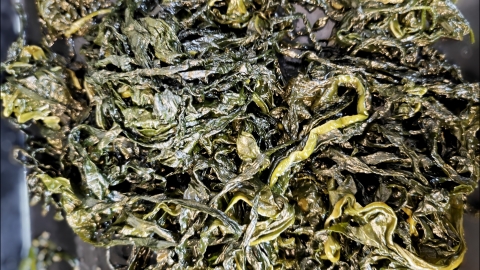Which three types of people should not eat wakame?
Generally speaking, there is no such thing as "three types of people who cannot eat wakame," but people who are allergic to wakame, those with spleen and stomach deficiency-cold, individuals taking anticoagulant medications, patients with renal insufficiency, and people with hyperthyroidism should consume wakame cautiously. Detailed explanations are as follows:
1. People allergic to wakame: After consuming wakame, the immune system of these individuals may identify certain components in wakame as harmful substances, triggering allergic reactions. Common symptoms include skin itching, rashes, urticaria; in severe cases, symptoms such as nausea, vomiting, and difficulty breathing might occur, posing threats to health.

2. People with spleen and stomach deficiency-cold: Wakame is inherently cool in nature. Individuals with spleen and stomach deficiency-cold often have weak digestive function and excessive internal cold. Consuming wakame can cause its cold nature to irritate the gastrointestinal tract, possibly triggering or worsening discomfort such as abdominal pain, diarrhea, and loose stools, affecting the normal digestive function of the spleen and stomach.
3. Individuals taking anticoagulant medications: Wakame contains a certain amount of vitamin K, which can promote blood coagulation and thus affect the efficacy of anticoagulant drugs. Consuming wakame while taking these medications may weaken the anticoagulant effect, increasing the risk of blood clot formation, which is detrimental to disease management.
4. Patients with renal insufficiency: Wakame is rich in potassium, which is primarily excreted by the kidneys. Patients with impaired kidney function have reduced metabolic capacity and cannot effectively eliminate excess potassium from the body. Overconsumption of wakame may lead to potassium accumulation, possibly causing hyperkalemia, which can result in symptoms such as limb weakness and arrhythmia.
5. Patients with hyperthyroidism: Wakame contains abundant iodine, which is an essential raw material for the synthesis of thyroid hormones. Patients with hyperthyroidism already have excessive secretion of thyroid hormones. Consuming excessive iodine may further stimulate the thyroid gland, potentially worsening the condition and intensifying symptoms such as palpitations, hand tremors, and excessive sweating.
The above-mentioned groups should clearly understand their own contraindications to avoid physical discomfort caused by consuming wakame. Other individuals should also control their intake, choose fresh wakame, thoroughly wash it before cooking, and ensure food safety.




